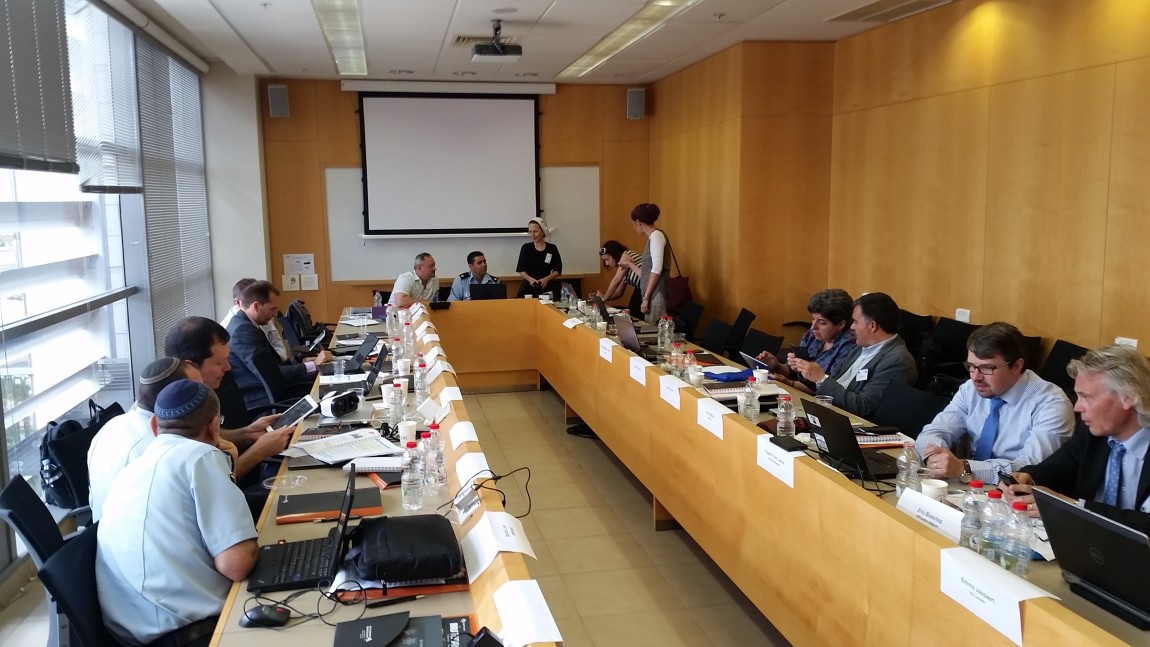
Kick-Off Meeting
On the 1st and 2nd of June 2015 the Kick-Off Meeting of LAW-TRAIN was held in Israel. All ten Consortium partners attended the event in order to present and discuss workpackages, tasks and deliverables. The kick-off was hosted by the project coordinator, Bar-Ilan University from Israel. This report presents a quick introduction to the project and objectives.
- What: LAW TRAIN aims to develop a virtual gaming platform for training a cross-national investigation team to fight international drug trafficking. The training system will enable enforcement units to train in a virtually simulated environments which are similar to real-life multi-national investigations.
- Who: LAW-TRAIN is a European Union Horizon 2020 project. The virtual gaming platform is developed in collaboration of ten Consortium partners from five different European nations. The Consortium is made up of universities, national governments, law enforcement units and professional enterprises.
- For Whom: In the first stage, end users will be national governments and law enforcement units engaged in fighting international drug trafficing.
- Why: Investigation of international crime requires sophisticated skills and familiarity with different cultures, multinational teamwork, diverse investigation/interview methodologies and concurrent collaborations between nations. Training for such scenarios by role-playing simulations is highly complex and expensive. The virtual training platform aims to cut costs and improve the level of training for cross cultural investigations.
The workplan of LAW-Train is divided into 8 distinct workpackages, altogether lasting 36 months. Since the work is highly collaborative, several partners will be involved in each of the workpackages (WP).
Two workpackages – that will last for the entire project’s duration and will run in parallel –are Project Management (WP1 conducted by Bar-Ilan University) and Dissemination and Exploitation (WP8 contacted by USECON).
The first operational work package, WP2 conducted by USECON, focuses on determining the technical and methodological specifications needed to define the entire project with regard to its components: 1) The collaborative Virtual Investigation Game, the Virtual Suspect that will be interviewed and the training tools that enable the trainer to easily generate new characters and scenarios and tools that provide real time feedback and diagnostics. In WP2, the integrated global view of these components will be harmonised, so that each partner will be provided with a clear definition of the goals, schedule, interfaces etc., and will be able to synchronise the effort conducted in parallel by several partners and align the research goals.
In WP3, led by Katholieke Universiteit Leuven, the foundation of the methodology and training curricula for conducting joint investigative interview by international teams, particularly in the context of organised drugs trafficking crimes, will be developed and specified. This methodology will be the basis for the game development (WP4), the development of the Virtual Suspect (WP5), the Training Agent (WP6) and the testing and evaluation (WP7). The methodology will be developed based on both the theory and practice in such investigations.
In WP4, led by Serious Games International Ltd, the Serious Virtual Reality Game will be developed. It is planned to integrate the game into the actual life and working environment of the trainees, bringing them to the Virtual Suspect and the other team members, much like the real interaction.
WP5, led by Bar-Ilan University, will develop innovative methodologies and algorithms for the four modules of the Virtual Suspect: Database, Psychological Module, Decision Making Module and a Behavioural Model. The development of these modules will integrate machine learning, expert extraction rules and state of the art virtual human technology.
WP6, led by Instituto de Engenharia de Sistemas e Computadores, Investigacao, will focus the development of tools that will allow the trainer to create new scenarios and gaming setting. A deep off line diagnostics for both the trainer and the trainees will be developed and also an agent capable of providing the trainees with real-time comments.
Work in WP4-6 will be performed in parallel and will serve as input to the integration phase of WP7 which is led by Optimización orientada a la sostenibilidad S.L.. There, system integration, testing and evaluation will be executed incrementally. First, each module will be evaluated expertly using extensive short simulation and user studies. The integrated LAW-TRAIN system will then be evaluated in a long term study. During the evaluation the performance of the users will be measured, the improvement of their skills and the satisfaction from the Virtual Suspect.
WP8, conducted by USECON, will focus on the Dissemination and Exploitation of the results of LAW-TRAIN. A business model will be developed to facilitate exploitation and a full business will be prepared.
